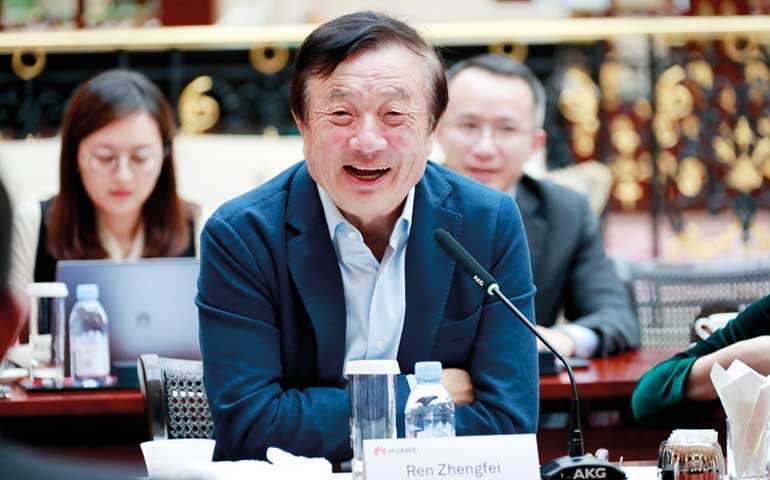Tuesday Feb 17, 2026
Tuesday Feb 17, 2026
Monday, 21 January 2019 00:00 - - {{hitsCtrl.values.hits}}

Huawei CEO and Founder Ren Zhengfei recently said that 2019 could be a difficult year for Huawei; however the company, is targeting $ 125 billion in revenue for the whole year.
Huawei has not released its total revenue for 2018 yet, but Eric Xu, one of the rotating chairmen at the technology giant, told reporters recently that in November 2018 sales would top $ 100 billion.
“In 2019 we might face challenges and difficulties in international markets. That is why I said ... our growth next year would be less than 20%,” Ren said.
In a rare sit down with international media, Ren addressed concerns raised by the US government, which has warned that the company’s equipment could allow the Chinese government to have a backdoor into a nation’s telecommunications network. Ren, speaking Mandarin and using a company-provided translator, told the group that Huawei has never handed data to Beijing.
Speaking to reporters Ren further said that over the past 30 years, Huawei products have been used in more than 170 countries and regions, serving more than 3 billion users in total.
“In total, we have been granted 87,805 patents. In the United States, we have registered 11,152 core technology patents. We are actively involved in 360+ standards bodies, where we have made more than 54,000 proposals” Ren pointed out.
“So we are the strongest in terms of telecommunications capabilities,” Ren said adding that he believes that people will make their own comparison in the end between countries that choose Huawei and countries that don’t work with Huawei.
“Of course, there is no way we can control their choice,” Ren said adding that in terms of 5G, Huawei has signed 30-plus commercial contracts to-date, and they have already shipped 25,000 5G base stations.
“We have 2,570 5G patents. I believe that, as long as we develop very compelling products, there will be customers who will buy them,” he said.
“When it comes to cybersecurity and privacy protection we are committed to be sided with our customers. We will never harm any nation or any individual,” Ren told the journalists assembled at Huawei’s headquarters in Shenzhen, China.
“China’s ministry of foreign affairs has officially clarified that no law in China requires any company to install mandatory back doors. Huawei and me personally have never received any request from any government to provide improper information,” Ren added.
“The values of a business entity is customer first, is customer centricity. We are a business organisation so we must follow business rules. And in that context I don’t see close connection between my personal political believe and our business actions we are going to take as a business entity. And I think I already made myself very clear right now, we will definitely say no to such a request,” Ren said, when asked by reporters about whether his ties to China’s ruling party would stop him from fighting any kind of data request.
Customer-centricity has been at the very core of Huawei’s business operations since our founding. We will never do anything to harm the interests of our customers.
When queried by journalists why Huawei still remains as a privately owned company Ren said that he thinks that there are very few success stories where public companies become strong and big.
“Capital tends to be greedy. Whenever there is an immediate interest, capital tends to take it away, and that would certainly compromise the long-term pursuit of ideals. We are a private company, so we are able to remain committed to our long-term ideals,” Ren added.
“Ever since we were a relatively small company, with just several hundred employees, we have focused all of our efforts in one direction. Even as we grew larger, to several thousand, tens of thousands, or even today with over 100,000 employees, we have maintained the same focus as we move forward,” Ren emphasised.
He further noted that Huawei’s annual R&D (Research & Development) investment has reached $ 15 to $ 20 billion and that over the next five years, Huawei is going to invest a total of more than $ 100 billion into R&D.
“Public companies, however, are unlikely to do this, because they focus on making their balance sheets look good. What matters more to Huawei is the future industry structure. Our decision-making system is different from public companies. It is very simple, and we are working hard to make the information society a reality,” he noted.
“I myself am the founder of this company. At the time when I wanted to found Huawei, I did not have enough money. When I got demobilised from the military, my wife and I received a total of CNY 3,000 as compensation from the military. At the time, a minimum of CNY 20,000 was required as registered capital to start a company in Shenzhen. By pooling funds from different people, I managed to get CNY 21,000 to register Huawei,” Ren further said.
“Today, the total number of shares that I personally have within Huawei is 1.14%, and the stake that Steve Jobs had in Apple was 0.58%. That means there is still potential for my stake to be further diluted. I should learn from Steve Jobs,” Ren added.
He noted that Huawei is more working towards streamlining internal management, improve products, and improve services. He further noted that whilst there are only several companies in the world working on 5G infrastructure equipment, and not many companies are engaged in microwave technology. According to him Huawei is the only company in the world that can integrate 5G base stations with the most advanced microwave technology. With that capability, Huawei’s 5G base stations don’t even need fibre connections. Instead, they can use superfast microwave to support ultra-wide bandwidth backhauls.
“This is a compelling solution that makes a lot of economic sense. It works best for sparsely populated rural areas,” he
concluded.